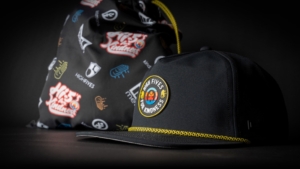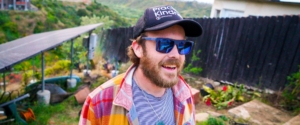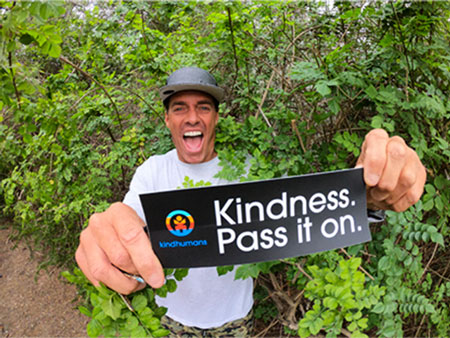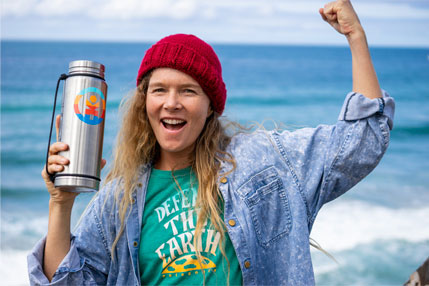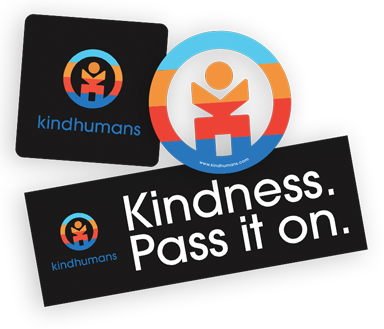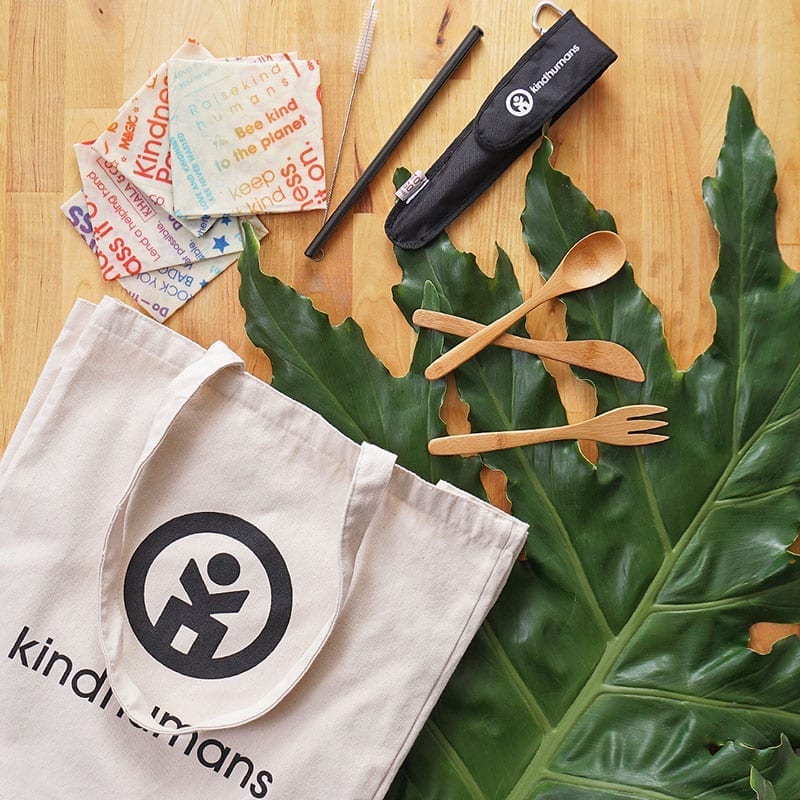
The Economic and Social Effects of Choosing Reusables
Stoked on SustainabilityThe Economic and Social Effects of Choosing Reusables
Ian McKeown is an athlete, educator, and sustainability advocate. We got his take on the importance of outdoor sports in nature to fuel sustainability, social justice, and voting via equitable choices in the products you use. – KH
Our world is in great turmoil right now. Political changes, social justice, unprecedented environmental challenges, inequality, and Covid-19 have altered our lives. However, in this strife is great hope; a revolution is afoot. It is important now more than ever to live consciously and be aware of the effects of our decisions as they reverberate throughout society.
Humankind’s passion for production, advancement, and consumption plays a major role in the problems we face. That surfboard, mountain bike, snowboard, skateboard, pair of running shoes, or other piece of outdoor gear is a tool to a better life. These tools shape us as individuals through the boundaries of human performance and the lens we use to interact with the world as we connect with nature and each other. The convenience of new products, technologies, and services is not without impact. Americans don’t only vote with ballots, we also vote with our hard earned dollars. That is why it is so essential to make choices by “investing” in products that have purpose in their mission. We must make purchases that promote equality through social justice, have transparent labor practices, work towards a net positive impact on the planet, educate, and defend the environment. It is through innovation that we will create a better world.
I started working in the environmental field because as an outdoor athlete, I continued to see the net positives nature and adrenaline-based natural activities had on our communities. We are also canaries in the coal mine for the greatest issues we face. We bear witness to a warming planet, pollution, changing weather patterns, altered sea life, and the endless tap of plastic pollution. As an outdoor athlete, environmental scientist, activist, entrepreneur, community service participant, and sustainability educator, it is clear that responsible purchasing has massive impacts on your own financial savings and social currency. We as consumers must ask questions about our impact. If everyone stopped buying harmful products tomorrow, we would see a paradigm shift in our planet’s greatest struggles.
“Consumer activism and demand is a powerful tool. Use your wallet to vote while outside the polls.”
This is a tough road to navigate, but kind humans can help. We are in a time of spectacular global transition and now, more than ever, we should reflect on our mortality and the impact we are having on the world. Here are some amazing environmentally friendly products that help reduce our impact on the planet, fight for social good, potentially help protect your health, and save you money.

Shop Kindhumans x MiiR Reusable Water Bottles
Bottled Water
Personal Economics
By choosing reusable water bottles, you could reduce the cost of staying hydrated from nearly $500 to just $60!
The high quality Kindhumans x MiiR 20oz bottle is stylish and vacuum insulated to keep your drinks cool or warm for long periods of time. A standard bottle cannot claim to control the temperature or have the same style.
A bottle like this costs just north of $30 dollars and you can wash and reuse these stainless steel bottles for years. At the end of its life, stainless steel is recyclable metal.
The average single-use 16 oz bottle costs about $1.45, and the average hydration recommendation is eight 8 oz glasses per day. Average use consumption is 42 gallons of bottled water a year, which is 5376 ounces, or about 336 16 oz bottles a year. That’s about 28 bottles per month. At that rate, at an average of $1.45, that is a $487 cost to the individual. If a person had two reusable bottles to cycle through for about $60, they would save enough money to purchase a water filter.
Environmental Impact
By 2030, we will have more plastic in the ocean than fish if we continue at the rate we’re going. We must turn off the plastic tap.
Single-use plastics have an absurd environmental impact. Think about that single bottle of water made of mostly virgin plastic, all the energy to produce that bottle, all the oil it takes to ship that water on a truck, and the energy to keep it cold in the store. Then you use it once and a truck must move it (if it makes it into a recycling bin) to a fragile recycle system that may take that material and ship it to a foreign country to make a new product. That is just for one fork or one bottle of water.
Plastic takes thousands of years to break down, Globally, over 80 tons a year of plastic waste enters our oceans. Americans throw away 35 billion plastic bottles a year. Only 25% of plastics are recycled. 20% of oil industry production is for plastic production. Plastics in our environment are choking fragile ecosystems. We must vote by refusing to buy single-use plastic products.
Social Impact
By choosing brands like MiiR, you are ensuring that the products are manufactured in a safe environment and you fund a company that supports environmental and social causes.
Health Impact
Municipal water is generally clean and tested to a higher standard than bottled water. Most bottled water is rebranded tap water. Furthermore, plastic bottles have an increased risk of leaching potentially health-damaging, enzyme-disrupting hormones in addition to microplastics that will have long term health effects
COVID Impact
In the age of COVID, we should be minimizing our exposure and risk to touching surfaces, our face, and being close to others.
The idea of going into a store, buying plastic products stored in a cold environment, (which helps the longevity of the virus) and touching a surface that holds the virus longer is increasing the risk. A study found that the virus can be measured for up to 72 hours on plastic, 48 hours on stainless steel, 24 hours on cardboard, and 4 hours on copper. Furthermore, every time you interact with someone or enter a closed space you are increasing a chance for exposure. Bringing your own water bottle, you are saving money and reducing exposure risk to the virus.

Shop Kindhumans Organic Cotton Totes
Shopping bags
Personal Economics
You could have 15 reusable Kindhuman Cotton Totes for the same cost as the 2,000 single-use shopping bags you’re statistically likely to buy in a year.
The Food Industry Association’s annual U.S. Grocery Shopper Trends study, prepared by The Hartman Group states that average household food shopping frequency is about 2.7 trips weekly in the U.S. Given that assumption, with 52 weeks in a year, that is about 140 grocery trips in a year.
The average family uses 15 bags per trip.
That means one person or family could be using over 2,000 bags in a year! If you have a bag fee of 10 cents, that is $200 per year in single-use plastic or paper bags!
For example, the high-quality Kindhumans Cotton Tote is stylish, clean, and you can wash it and reuse it for a long time. If you bought 15, you are about breaking even with bag fees annually and drastically reducing your impact on the planet. You can also use the reusable bag for other non-grocery trips and increase your payback and utilization. Such cotton bags will last years, so you could have hundreds of dollars back in your pocket of avoided bag fees.
Environmental Impact
By choosing a reusable bag, you’re helping keep plastic out of landfills and the ocean, and you’re preventing excessive oil consumption by reducing production of plastic bags.
Plastic and paper bags are extremely wasteful to produce and recycle.
Unfortunately, large oil lobbies have been successful getting around plastic bag bans. As we switch to efficiency, clean energy, and electric cars, demand will fall for oil, so they will continue to lobby for plastics. Only 1% of plastic bags are recycled and Americans use 100 billion plastic bags a year. 14 plastic bags use the equivalent oil as gas to drive a car 1 mile.
This is a huge environmental impact! It is time to kick the habit. Be an activist with the local government and your stores as the customer and demand to be plastic-free.
Social Impact
Plastic bag production and waste have a huge impact up and downstream. Refineries and production disproportionally impact marginalized communities as they are often living around refining and factories. We have a civic responsibility to protect those who live around these sites.
Health Impact
Production pollution is massive from refineries and causes air quality issues, long term global warming potential, and downstream impacts on the food chain and water quality.
COVID Impact
By bringing your own bag, you know where it’s been and how clean it is. If your store does not allow you to bring your own, you can ask them to refill your cart. Then, you pack your own groceries and clean them as you put them into your own reusable bags outside before you head home. This will lower your contact with surfaces, especially plastic, where the virus can survive the longest.

Shop Kindhumans Bamboo Cutlery and Simply Straws.
Straws and Cutlery
Personal Economics
Unlike buying packs of single-use straws and utensils, investing in Kindhumans Bamboo Cutlery and a Simply Straws Sip Set means a one-time purchase that can last years.
A reusable straw costs $12 and a portable utensil set is $13.99. You can wash and reuse these utensils for years to come. When you’re done with stainless steel, it’s recyclable and bamboo is biodegradable and it is one of the fastest renewable growing plants.
In the U.S., people use 500 million drinking straws per day. That’s an average of just less than 2 straws per person per day. That means that the average person will use almost 500 drinking straws in a year. Although the cost of straws and utensils might not be huge, the alternative of spending only around $26 and saving the planet is a much better investment.
Environmental Impact
By carrying reusable utensils and straws, you can keep hundreds of millions of plastic utensils and straws out of landfills.
The Bamboo Cutlery and Simply Straws stainless set allows you to bring your own utensils and straw with you and refuse single-use plastic straws and alternatives no matter where you go.
Consider that single-use straw or those plastic utensils and all the energy used to make and ship them to your door to just be used once. These straws and utensils are not recyclable, so they go to the landfill. This can lead to leaching of materials into precious groundwater at landfill sites, land-use problems, and methane emissions. Methane is emitted by decomposing material in landfills and it is roughly 28 times more effective than C02 at trapping heat in the atmosphere.
In the U.S., people use almost 100 million plastic utensils a day! That’s 36,500,000,000 plastic utensils wasted in a year.
Worse yet, plastic takes thousands of years to breakdown. Straws cannot be recycled and Americans use 500 million a day! These sustainable products are a simple way for us to cut down on our impact.
Social Impact
By choosing brands at Kindhumans, you know the production environment is healthy and that the company is advocating for our environment and for human rights.
Be an activist! Every time you get a beverage, try to use your own container. Under current circumstances, you might not be able to do so, in which case you can ask them to provide paper cup choices without lids and you can use your own straw. You can deny plastic utensils on deliveries or pick up and bring your own when you go out. Every purchase is a chance to be an activist and educate. The plastics industry is leveraging COVID and by telling your favorite business what you prefer, you can help stop the plastic industry from dominating.
COVID Impact
Using your own straw or utensils keeps your lips or face from surfaces and contamination from the public.
Author Profile

Ian McKeown is a kiteboard athlete, environmental activist, and sustainability advocate. He has a passion for environmental preservation as a direct result of his love of adventure, sports, and teaching, his scientific curiosity, and his fascination with entrepreneurship.
“Wear a mask, keep distant, and love your neighbor from a distance. The pandemic is the perfect time to rediscover your background responsibly. This is our time to rediscover nature near home.” – Ian







